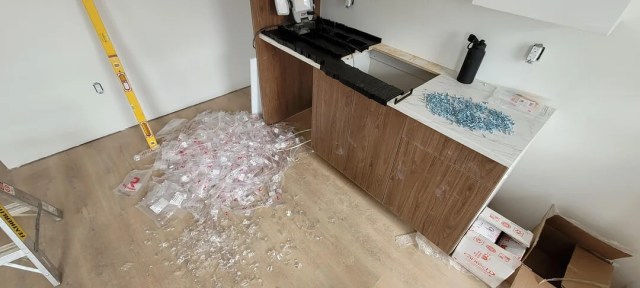While many consumers are trying to break up with plastic packaging, some manufacturers are doubling down on it. Excessive plastic wrap appears everywhere, from the grocery aisle to the hardware store. Professional contractors haven't escaped, either, as one Redditor demonstrated.
What happened?
The Redditor, who claimed to be a production kitchen installer, posted on r/Carpentry with a photo from their latest job site. "Every couple weeks you just have that one day that makes you hate your job," they lamented.

Their photo shows a kitchen cabinet being assembled. On the counter is a large pile of bolts. On the floor, there's an even larger pile of plastic bags in varying sizes.
"Four hundred handles [and] 800 screws wrapped individually in about 850 pieces of plastic," the original poster explained.
"This should be illegal," said one commenter.
Others agreed. "Someone should be imprisoned for forcing this much plastic waste into existence," said a second user.
What's the problem with plastic bags?
First of all, having to remove individual bolts from plastic wrappings is inconvenient and increases construction times, which could cost consumers money.
Second, the trash left behind is a hassle to deal with, especially when it's in many small pieces.
Third, there's the impact on the Earth. Making plastic is hard enough on the environment since it's manufactured from oil, which pollutes the area where it's extracted.
Even worse, however, is what happens after a piece of plastic has served its purpose. It's extremely hard to dispose of without hurting the environment. If left in a landfill or dumped as litter, it lasts 100 years or more without breaking down naturally.
Plastic producers have promoted recycling as the correct option — but plastic can only be recycled a handful of times, unlike metal or glass, which can be reused endlessly. In fact, a lot of plastic waste simply can't be recycled at all — especially small, flexible pieces like these bags.
In the end, most plastic waste either ends up in a landfill or somewhere in the environment, such as the ocean. Once there, it pollutes its surroundings with trillions of microplastics.
What is the supplier doing to be more eco-friendly?
Based on the branding visible in the original poster's photo, the over-packaged products came from Richelieu Hardware. The company offers a selection of green products, including some made from recycled material. There's even an option to look for only green products when you search Richelieu's catalog.
However, that still leaves many products that aren't eco-friendly, in addition to the harmful packaging. The company has a lot of room to improve.
What can I do to reduce plastic waste?
Wherever possible, choose suppliers who are committed to minimizing plastic. The more customers move to green options, the more pressure there is on companies to make better choices for the environment. Plus, you can often save money when you cut out unnecessary packaging.
Also, look for plastic-free alternatives to products.
Join our free newsletter for cool news and actionable info that makes it easy to help yourself while helping the planet.









